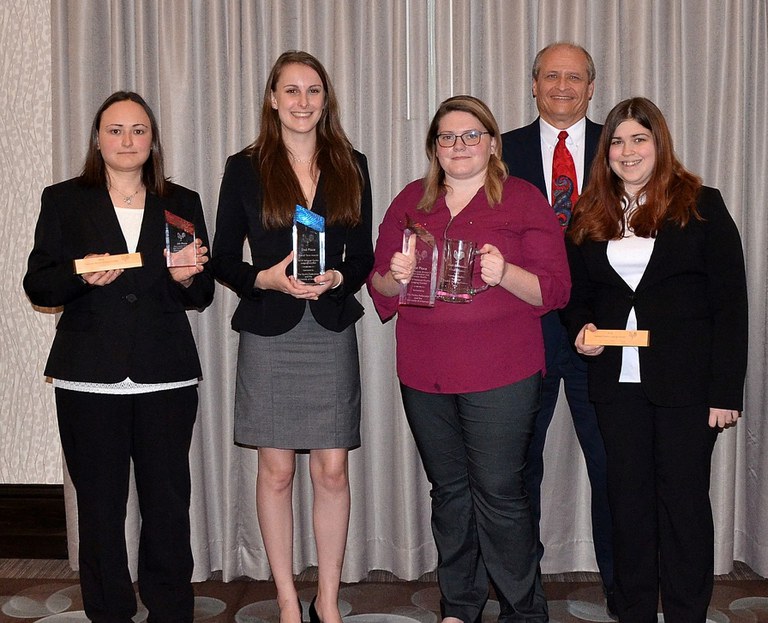Posted: November 15, 2018
Team Member Katie Sondericker tied for first place individual overall; team also placed first in Breed Selection and Carcass Quality Division and fourth in Egg Production and Quality Division.

Penn State's Poultry Judging Team, from left: Heather Sciubba, Hannah Menges, Katie Sondericker, Phillip Clauer and Amanda Kulp
Penn State's Poultry Judging Team placed second in the nation at the 53rd National Collegiate Poultry Judging Contest held November 5-6 at the Center of Excellence for Poultry Science at the University of Arkansas.
Penn State's team scored an impressive 4,069 points out of 4,500. A Penn State team has placed second eight times, first three times, third two times and fourth once since 2005. This year's team placed first in Breed Selection and Carcass Quality Division and placed fourth in the Egg Production and Quality Division.
Katie Sondericker, Attica, NY, tied for first overall individual and was first individual in Breed Selection and Carcass Quality Division and was 14th in the Egg Production and Quality Division; Heather Sciubba, Newtown Square, PA was ninth overall and seventh in the Breed Selection and Carcass Quality Division; Amanda Kulp, Halifax, PA was 10th overall and sixth in the Egg Production and Quality Division; and Hannah Menges, Danville, PA was 16th overall, tenth in the Breed Selection and Carcass Quality Division.
Phillip J. Clauer, Senior Instructor in Penn State's Department of Animal Science, coached the team. All the team members are senior animal science majors with minors in poultry and avian science.
Dr. Terry Etherton, Head of the Department of Animal Science, said, "I offer sincere congratulations to the students for their outstanding performance in the national judging contest. The consistent accomplishments of Penn State teams on the national level is a tribute to the excellent preparation they receive from our faculty and staff and to the enormous dedication and hard work of our students."
Overall team rankings were: First Place - Texas A&M University; Second Place - Penn State University; Third Place - University of Arkansas; Fourth Place - Mississippi State University; Fifth Place - Ohio State University
Other teams participating were: North Carolina State University, Louisiana State University and Kansas State University.
Students are selected for the team by enrolling in a 13-week poultry science course and competing for a spot during the spring semester. The team then completes a rigorous nine week training program to prepare for the fall contest.
The Egg Production division includes seven classes: ranking two classes of five production hens for past production traits, two classes of five Pullets for future production traits and grading three 25 egg classes of exterior quality, interior candled and broken-out.
In the Breed Selection division, there are eight classes: ranking a male and female class of eight-week-old broiler breeders, a male and female class of 24-week-old broiler breeders, a male and female class of turkey breeders and grading two classes of 25 ready-to-cook carcasses for USDA grade standards.
In these classes, contestants must demonstrate their ability to select the breeders that will produce the most eggs and the offspring that will produce the meatiest carcass most efficiently. Students also are judged on how well they have mastered U.S. Department of Agriculture rules and regulations governing the grading of eggs and poultry carcasses.
Anyone interested in poultry science or being on the poultry judging team may contact Phillip Clauer at pjc19@psu.edu. There are abundant employment opportunities for students with the Poultry and Avian Science minor and a multitude of opportunities available to students in the Department of Animal Science through student clubs and teams. For more information visit http://animalscience.psu.edu/students
The Poultry Judging Team received partial funding from the Office for Undergraduate Education "Student Activities Fund" to enable participation in this event.

